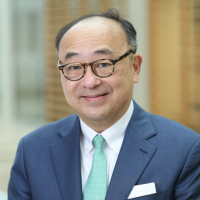Charles C. Hong, MD, PhD, FAHA, FACP

- Chair of Medicine
- MSU Research Foundation Distinguished Professor
- Department of Medicine
- Division of Cardiology
- Professor
- Clinic Address: MSU Health Care Heart and Vascular Center, 4660 S. Hagadorn Rd., Suite 600, East Lansing, 48823
- Clinic: 517-267-2460
- Academic Address: Clinical Center 788 Service Rd Room B425 East Lansing MI 48824
- Academic: 517-432-9124
Academic Support Staff: Renee Brittain & Melanie Turner
BIO
Dr. Charles ("Chaz") Hong is a physician-scientist, entrepreneur, Chair of the Department of Medicine, and Research Foundation Distinguished Professor at Michigan State University College of Human Medicine (MSU CHM). He is a pioneer in the field of chemical genetics of embryonic development. Using this innovative multidisciplinary approach, Dr. Hong elucidated the opposing roles of PI3K (Phosphatidylinositol 3-Kinase) and ERK signaling in artery-vein specification. This discovery, which was cited in his election to American Society for Clinical Investigation (ASCI) and American Association for the Advancement of Science (AAAS) Fellow, laid the mechanistic foundation for treatment of venous malformation syndromes with PI3K inhibitors. His later invention of dorsomorphin, the first small-molecule inhibitor of bone morphogenetic protein (BMP) signaling, has reshaped our understanding of this pathway in embryonic development and disease processes, spurring clinical stage drug development programs for anemia of chronic disease, and other devastating disorders. Moreover, Dr. Hong’s small molecules are now cornerstones of nearly all protocols for generating human neural tissues from pluripotent stem cells, driving advances in neurologic disease modeling. Recently, his work on the first extracellular proton sensing receptor inhibitors revealed a novel cancer survival pathway tied to the Warburg Effect, offering a promising strategy to selectively induce ferroptosis in glioblastoma and other cancers. Additionally, using patient-derived iPSC technology, Dr. Hong identified defective centrosome deconstruction during cardiomyocyte maturation as the cause of infantile dilated cardiomyopathy—the first human disease linked to this process.
A graduate of MD-PhD program from Yale, Dr. Hong completed his clinical cardiology training at Massachusetts General Hospital, followed by postdoc in chemical biology at Harvard Medical School. Prior to coming to MSU in 2023, he was on faculty at Harvard Medical School, Vanderbilt University School of Medicine, where he directed its inherited heart disease center, and University of Maryland School of Medicine, where he was Mevlin Sharoky Professor of Medicine.
Dr. Hong is honored to lead the MSU CHM Department of Medicine at this transformative period, with exciting opportunities in discovery, innovation, education, and patient care. His vision is to help make MSU a dynamic innovator in Academic Medicine, attracting and developing future leaders who will transform the innovation landscape across Michigan and build a more just and healthy society.
EDUCATION AND CERTIFICATION
Education
1988 B.S. Life Sciences, Massachusetts Institute of Technology
1998 M.D., Yale School of Medicine
1998 Ph.D. with Highest Honors, Genetics, Yale School of Medicine
Post Graduate Education and Training
1998 - 1999 Internship, Yale-New Haven Hospital
1999 - 2001 Residency, Internal Medicine, Yale-New Haven Hospital
2001 - 2004 Fellowship, Cardiology, Massachusetts General Hospital
2001 - 2005 Research Fellowship, Chemical Biology, Harvard Medical School
Certifications
2001 ABIM Board Certification in Internal Medicine (lapsed)
2005 ABIM Board Certification in Cardiovascular Disease
MSU SCHOLARS
MSU Scholars highlights the research activity of Michigan State University, showcasing faculty experts for regional, national, and international research and business communities.

